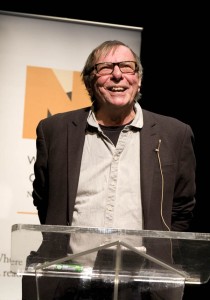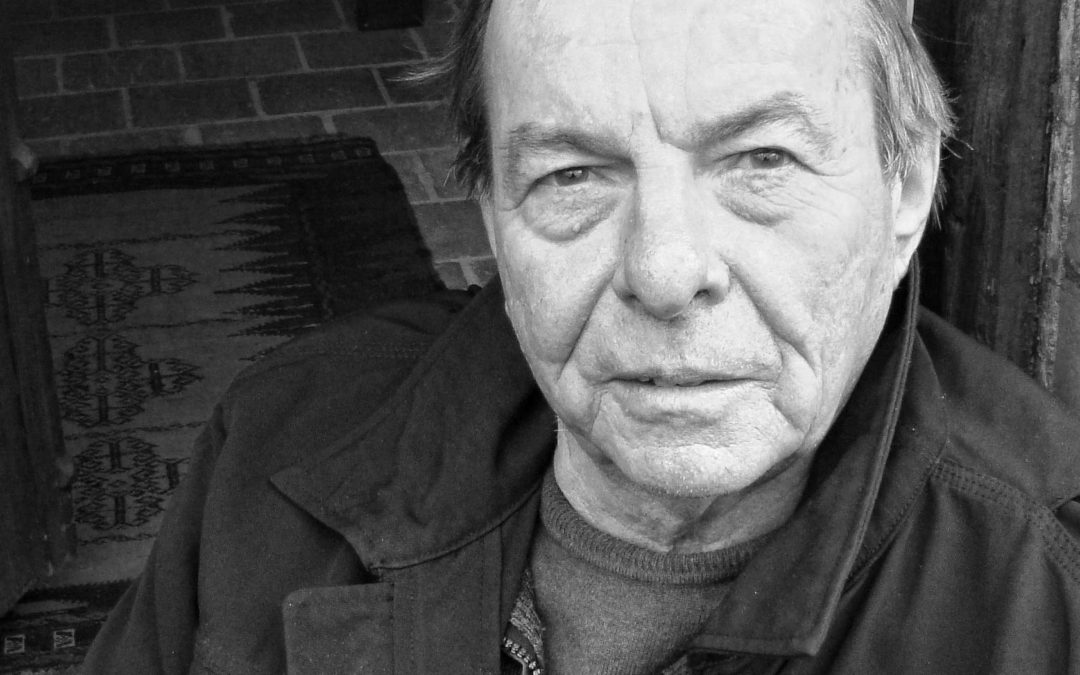
Michael Mackmin. Photograph: Martin Figura.
When I came to type up the poems I’d accepted for the ‘Summer’ Rialto (No. 78) I found I was several pages short of an issue. So I have had to do some concentrated reading to find more, excellent, poems. And at about the same time as I was doing this Seamus Heaney died. I thought that we needed to mark this huge loss, and, after trying to persuade a few other people to do it for me, set about writing about him. I then found myself suffering (it lasted a week) from a sharp attack of writers’ block – who am I sitting here trying to put into a couple of pages the work of a major figure? Etc.
We are now back on track and the typescript of the new issue – more of a Late Harvest issue now, than a Summer one ( Yesterday I drove past a huge lorry loaded with what I call French beans but are known around here as Bobby beans, presumably on their way to be frozen) – is with Nick, who is setting it all up and getting it ready to go to be printed.
We now have two Assistant Editors. Ollie Dawson, director of the Poetry School, and I spent an intense day in September interviewing a very competitive shortlist (compiled from a remarkably well qualified long list) of candidates for these posts. They all spoke enthusiastically and knowledgeably about poetry. They were all reading quantities of it, and all writing it. I’d hoped to hear that, but what hadn’t occurred to me was the commitment and the relish they had for our art. Moreover I sensed that they don’t feel alone and isolated in their pursuit of poetry, they belong to a community. More than one person said that this is an exciting time to be a poet. A remark that for me has a huge wow factor.
We chose Fiona Moore and Abigail Parry: Fiona has a pamphlet The Only Reason For Time, published this year by HappenStance, Abi is just finishing a Ph.D on wordplay in contemporary poetry. They are already reading poems that have been submitted to the magazine. I’ll be mentoring their work, and I’ll continue to read all the intake myself. They will have a voice (voices) in the selection of the poems for the next issue (No.79, Winter 2013/14). If you are a poet anxious about change in the selection process please be re-assured, they’re definitely not duffers and we will be working closely together. By the Spring 2014 issue they will be in charge of selecting the work for fifteen pages of the magazine. This will be the culmination of their participation in our Editor Development Programme. And by this time we will have selected two more Assistants to succeed them. I have every confidence that this inclusion of new and very talented people will be a good thing for The Rialto.
There is still (just!) time to enter the Rialto/RSPB Nature Poetry Competition. The closing date is September 30th – that’s September 30th this year, in less than ten days time, not next year as some of you may be thinking. Last time our lead in was many more months longer than this time, but we are trying to ‘maintain momentum’.
How can I convince you of the importance of sending us some poems ( and some money)? I’m more than convinced myself by the prizes, not so much the cash prizes as the other two. Where else can you win a week on a writing course, and at such an amazing venue? The Lleyn Penninsula is an astonishing place, running out into the sea towards Ireland – go up on the cliffs beyond Aberdaron, risking the single track road, and look west and listen to the sea and the sky. And then there’s the famous additional prize, a walk with Mark Cocker in Norfolk. Mark has just published his brilliant Birds and People – I’m working my way through it, inspired by the huge display of knowledge. And here he is, a generous and unassuming man, offering to share his encyclopaedic enthusiasm for the environment and its inhabitants. It’s a great opportunity.
What more can I say? It’s September but the world that inspired Seamus Heaney’s ‘Blackberry-Picking’ and Sylvia Plath’s ‘Blackberrying’, is changing, vanishing. I know from my own memory, and it’s not defective, aged, in this respect, how diminished most of our landscape is. Entering the competition will be a shout out for change, for hope. And, who knows, you may also get your poem published in The Rialto?
Please Tweet, Facebook and generally gently bludgeon your friends and relations and followers into taking part!
We are also about to publish No 8 in the Bridge Pamphlets series. This is What I Saw, by Laura Scott. If you’ve a keen memory you’ll remember Laura’s great poem ‘Turner’ from a recent issue of the magazine.
Here’s what Mimi Khalvati says: ‘Laura’s poems seem to have been blown in on a breath of wind and air. A true lyric poet, she knows how to ‘paint light’, how to arrest our fleeting moments of sensation, those images in the corner of our eye, and magnify them so that we feel more sentient, more fully alive. And beyond the lyricism, a supple and questioning intelligence is quietly at work. I love her poems for their freshness, subtlety, and their delicate power to surprise.’
Prices. I seem, somehow, not to have fully taken in the fact that, in the process of ‘preparing the business for privatisation’, the Royal Mail has been hiking up prices. It currently costs £1.40 to send The Rialto by second class post within the UK. The rates to Europe and what they call ‘The Rest of the World’ are vastly higher – £7.20 for a single issue to go to America. The cover price of the magazine, £7.50, has been carefully worked out to cover printing costs, costs of payments to poets etc., so we are financially in trouble here. We will have to work out new rates that take this postal price problem into account ( once upon a time, for example, there was a special rate for Printed Papers – not any more). We hope to maintain a concessionary rate for UK subscribers on a low income.
Michael Mackmin
P.S. Since writing this, we have found that Abi got second prize with ‘The Wolf Man’ in the Poetry London Comp. Our congrats from all The Rialto Team. Abi and Fiona will also be blogging on here from time to time, or possibly quite frequently about their experiences in the editor’s chair at The Rialto. – Nick






